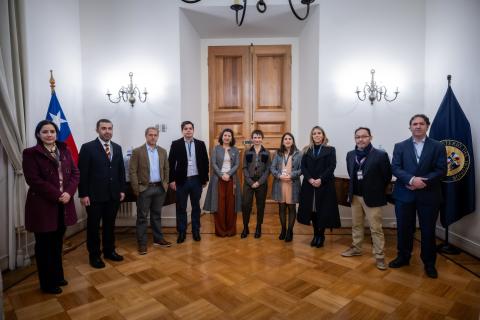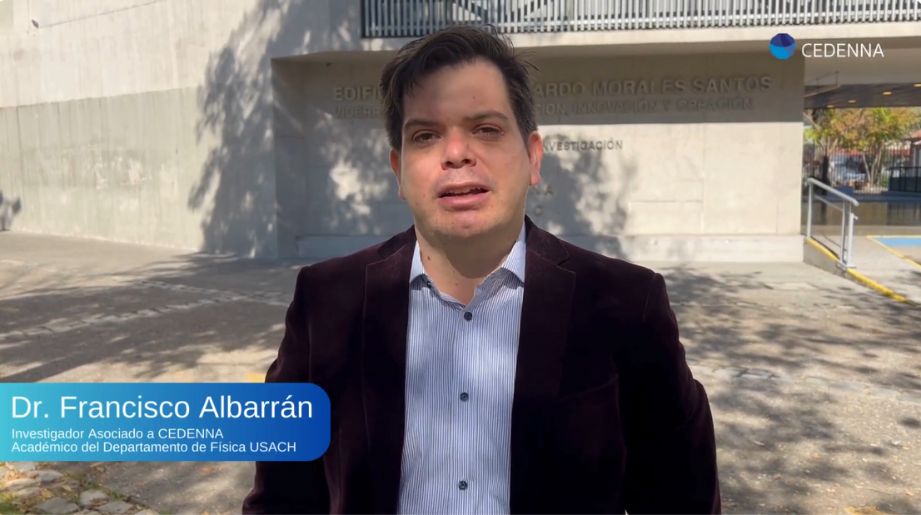
This Wednesday, at the La Moneda Palace, the Ministers of the Interior and Public Security, Carolina Tohá, and of Science, Technology, Knowledge and Innovation, Aisén Etcheverry, presented the new Expert Commission on Quantum Technologies, which will have the mission of developing a report with 15 recommendations aimed at guiding public policies in this field, within a period of 120 days.
Among the eight experts that make up this advisory body, is Dr. Francisco Albarrán, researcher associated with CEDENNA and academic at the Department of Physics of the University of Santiago.
His main areas of interest are quantum computing, machine learning, superconducting circuits, quantum technologies, quantum memristors and quantum control, maintaining collaborations with universities and foreign companies. He has published numerous scientific articles in recognized journals and has participated in international conferences and workshops.
"I find it very positive that Chile is implementing policies focused on cutting-edge technologies. Now we will be working on quantum technologies, and in the future it could expand to robotics, artificial intelligence, among other fields. It is essential that Chile develop policies in these areas to evaluate how they can impact the country and how, in turn, Chile can contribute to the development of these advanced technologies,” said Dr. Albarrán.
He added that “as a member of the commission, I feel a deep responsibility to contribute significantly to the country. It is essential to ensure that resources are used efficiently and to create opportunities for existing human talent and for future generations. We face the challenge of having many specialized professionals without jobs. Therefore, any initiative that encourages job creation seems excellent and necessary to me."
At the opening ceremony of the activities of this expert working group, the Minister of the Interior and Security, Carolina Tohá, valued the initiative and stressed that with it the Chilean State is anticipating the challenges and opportunities that its application represents in different matters. , like public safety. «It is important to prepare for the day when quantum plays a more leading role. That is not on the distant horizon, but quite imminent, and coincides with the moment when our Government begins to implement the Cybersecurity Law,” explained the chief of staff.
“Con el Ministerio de Ciencia estamos trabajando de cerca en varias iniciativas para ir incorporando avances, tecnologías o dispositivos de inteligencia artificial a distintas políticas públicas. Esta comisión y las recomendaciones que puedan salir de ella pueden ser un aporte en muchas dimensiones, en base a todas las potenciales que tiene la tecnología cuántica”, remarcó Tohá y agregó que desde la perspectiva de la seguridad pública “hay un foco muy importante en los temas de ciberseguridad, porque ahí hay oportunidades, pero lo que vemos más inminente hoy es la importancia de enfrentar los riesgos asociados”.
“With the Ministry of Science we are working closely on several initiatives to incorporate advances, technologies or artificial intelligence devices into different public policies. This commission and the recommendations that may come out of it can be a contribution in many dimensions, based on all the potential that quantum technology has,” Tohá remarked and added that from the perspective of public security “there is a very important focus on cybersecurity issues, because there are opportunities there, but what we see most imminent today is the importance of facing the associated risks.”
“Another key issue emerges from this: developed countries are creating much more sophisticated cybersecurity standards to face Quantum and if, as a country, we are not up to that level, we are going to lose the collaboration spaces that we have today in different industries.” Minister Etcheverry said.
About the Commission and its members
It is made up of eight experts who, within a period of 120 calendar days from today's first session, must deliver to the Ministry of Science, Technology, Knowledge and Innovation a report with 15 recommendations aimed at guiding public policies in this field. of technological innovation.
● Francisco Albarrán, CEDENNA researcher and representative of the University of Santiago de Chile.
● Stephen Walborn, representative of the University of Concepción.
● Dardo Goyeneche, representative of the Pontifical Catholic University of Chile.
● Carla Hermann, representative of the University of Chile.
● Claudio Torres, representative of the Federico Santa María Technical University.
● Aldo Delgado, director of the Millennium Institute for Research in Optics (MIRO.)
● Paulina Assmann, CEO and co-founder of the company SeQure Quantum.
● Sabina Torres Figueroa, representative of the Ministry of the Interior and Public Security.
Source: CEDENNA and Press
Ministry of the Interior Photography: Courtesy Ministry of the Interior
- Log in to post comments








